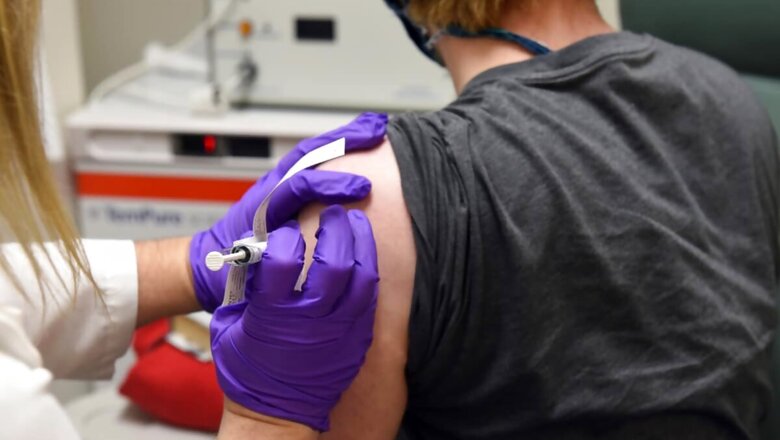
views
The government on Tuesday said that every person in the country does not need to be inoculated against the novel coronavirus. Health Secretary Rajesh Bhushan said there may not be a need to vaccinate the country’s entire population against COVID-19 if a critical mass of people are given a shot to break the chain of the virus transmission. Speaking on the issue, leading medical scientist Dr Gangandeep Kang on Thursday said that it is yet to be determined if those who already suffered from the disease need to be vaccinated and whether those who are not on the priority list will be inoculated or not.
Dr Kang, Vice Chairperson of CEPI (Coalition for Epidemic Preparedness Innovations), in conversation with News18, also spoke about vaccine efficacy and extending respect to volunteers of vaccine trials.
On WHO’s threshold of 50% efficacy for COVID-19 vaccine, she explained, “Even a vaccine that has 50% efficacy would have significant benefit in terms of controlling the pandemic. WHO set that as the bar for accepting vaccines for use.”
The government had earlier said that everyone will be vaccinated. Now they are saying that not everyone needs to be inoculated. How does that make sense? Given the fact that everyone across age groups have been affected.
Right now what we are hearing is high-level messaging. It is important to understand that even we have to immunize everyone in the country, it will not happen in a short time frame. The government may be prioritising at the moment according to the population that needs it the most while plans for others may evolve depending on the supply chain and what the products look like. At the moment, we do not have a single licensed vaccine and we have no idea when the vaccines will be available from a firm start date. We do have predictions. We have calculations of supply and need but the urgent need is for priority population and we will hear more from the government in days to come.
Does everyone need to get vaccinated? What if a person has suffered from COVID-19?
Data is yet to emerge for this. There are a lot of viral infections and SARS CoV2 is not unusual and there is some degree of protection once a person has had that infection. How strong that protection is? How long that protection is? Those are things we don’t know at the moment. The general discussion among vaccinologists is that even if you had an infection, it probably makes sense to get the vaccine because the vaccine gives you a much more predictable immune response than you would get from natural infection. Epidemiologists are looking at whether everyone needs the vaccine or not. If the goal is to think about public health, it is possible that we will be able to decrease transmission quite significantly even if we were to cover only 70 to 75% of the population. But if the goal is individual-level protection then the chances of that individual getting protected is much higher if they have received the vaccine.
What about people who are not on the priority list ?
For people who do not fall in the priority list, there will be more clarity in days to come. Right now the projections that CEPI is looking at it is optimistic. But if you are not on the priority list, in India or also in some other countries, it is expected that you will get the vaccine by the end of 2021, could be even well into 2022.
What about adverse events related to vaccines and how we deal with them? The one that happened during the trials for SII has led to some amount of apprehension? Is that fear justified and how does one deal with that fear?
No fear is unreasonable. Quite frequently when it comes to vaccines in general and medicines also, when the situation is emerging and you do not know what the possibilities are, when you have negative news you have questions. It is the responsibility of the scientific community and of the policy makers and also of those who make the drugs and vaccines to address those concerns appropriately.
If you hear about someone being potentially ill after participating in a trial and having an adverse event, you would be worried. What would clarify the situation for you would be a description of what happened. In this particular case, what is usually done is to make sure that participants are safe to describe the levels of oversight and to make it clear that in the rapid development of vaccines there are no corners being cut. That said, there is also no drug or any vaccine which is 100 % safe. Even the multi vitamins that you take have potential for overdose.
It is very important for us to understand that this needs to be done right. We have to ensure that those people who volunteer for trials are really looked after in the best way possible and are respected for their contribution. Anybody volunteering for research is contributing for a better tomorrow. We need to respect that and also ensure their concerns are addressed. If something happens to the volunteer during the trials, they have to be supported until they recover.
No vaccine gives 100 % efficacy but the threshold for 50% by WHO may not actually inspire confidence. Many people are question if it is even worth taking a vaccine?
Even when you take your child to a pediatrician, he will not tell you this vaccine is 90% or this is 60% efficacious. But that is actually the case. Many vaccines that we use everyday, none of them is a hundred percent vaccine. Very efficient vaccines are vaccines against measles and rotavirus vaccines. Rotavirus vaccine in its efficacy trial in India was about 55% efficacious but we use the vaccine and pediatricians are describing there are not as many diarrhea hospitalisations as we used to see earlier before the vaccine was introduced. So there is a difference between efficacy of a vaccine at an individual level and its potential to impact public health, which is something that needs to be communicated well. We are not communicating enough.
Even a vaccine that has 50% efficacy would have significant benefit in terms of controlling the pandemic. WHO set that as the bar for accepting vaccines for use. The USFDA did the same and I think 50% was very reasonable as an estimated efficacy for a vaccine that is targeting a respiratory infection. Most influenza vaccines do not work as well, still we use them.
News emerging now is fantastic but these are early readouts of 90-95%. And that is fabulous. To expect every vaccine to perform the same way is not going to be possible. A lot of the numbers we get as headline numbers, 90%, 95%, come from the fact that different trials are designed differently so when we are comparing these numbers, there can’t be a head to head comparison. So far we have not had any vaccine failures, so the news is really good.
Read all the Latest News, Breaking News and Coronavirus News here


















Comments
0 comment